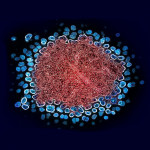A new federal grant totaling $23 million over seven years will look at the chronic illnesses that often accompany life with HIV—such as cancer, diabetes and lung disease—instead of focusing on the virus and its related immune challenges. The research will also explore the ways these illnesses affect men and women differently.
The grant from the National Institutes of Health (NIH) was awarded to researchers at Albert Einstein College of Medicine and its partnership with Montefiore Health System, both based in New York City, according to an Einstein press release.
“This change in emphasis makes our research much broader and more focused on the leading causes of illness and death among people living with HIV,” said co–principal investigator Kathryn Anastos, MD, professor of medicine and women’s health at Einstein and a general internist at Montefiore, in the release.
“People are living longer with HIV because of the miraculous success of antiretroviral treatment. As a result, the immune complications of HIV rarely kill people now—rather, it’s the advance of those other diseases, which often occur much earlier than expected in people living with HIV.”
The research will combine two ongoing studies—the 26-year-old Women’s Interagency HIV Study (WIHS) and the nearly 35-year-old Multicenter AIDS Cohort Study (MACS), a similar study in men.
Now called MACS/WIHS Combined Cohort Study, the new research will retain participants from the original studies (along with the data) and will enroll 2,500 more men and women.
Researchers hope to gain insight into the ways that age, race, ethnicity and health disparities affect HIV comorbidities as well as the progression of HIV itself.
“Enrolling both men and women will help us look into how HIV and chronic illnesses affect the genders differently, particularly as people age,” added Anjali Sharma, MD, MS, co–principal investigator, associate professor of medicine at Einstein and an infectious disease physician at Montefiore. “That knowledge can inform our understanding of gender differences in health and disease across the life span far beyond HIV.”







2 Comments
2 Comments